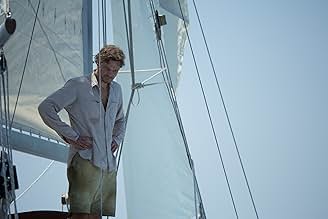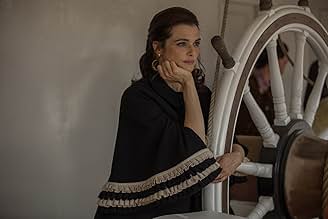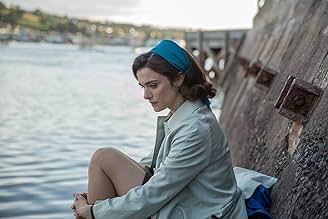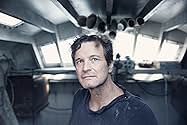अपनी भाषा में प्लॉट जोड़ेंThe incredible story of amateur sailor Donald Crowhurst and his solo attempt to circumnavigate the globe. The struggles he confronted on the journey while his family awaited his return is on... सभी पढ़ेंThe incredible story of amateur sailor Donald Crowhurst and his solo attempt to circumnavigate the globe. The struggles he confronted on the journey while his family awaited his return is one of the most enduring mysteries of recent times.The incredible story of amateur sailor Donald Crowhurst and his solo attempt to circumnavigate the globe. The struggles he confronted on the journey while his family awaited his return is one of the most enduring mysteries of recent times.
- पुरस्कार
- कुल 1 जीत
- Chamber Member
- (as Richard Blaine)
फ़ीचर्ड समीक्षाएं
The movie almost rushes through the intro, with rapid speaking lines and stressed scenes that don't feel all that natural. This is actually a problem all the way through, as it never slows down enough for us to truly take in the isolation and loneliness that Donald Crowhurst (Colin Firth, that is) must have felt in real life. We spend too much time on land and too little time at sea. As with many other films, it's hard to translate human thoughts onto the big screen ("The Old Man and the Sea" must be the classic example of this), and "The Mercy" fails on this note more often than it succeeds.
I do, however, still recommend the film, because it is still a good movie with good actors, and it's worth watching. It's just a shame that it doesn't reach its full potential, with a fascinating story such as this one.
I haven't seen "Crowhurst" (produced at the same time as "The Mercy", but by a different studio), but I've heard that that one is a bit better. In the end, "Deep Water" seems to be the best choice, however.
UPDATE (8 November, 2018): I have now seen "Crowhurst", and I am not sure if it's better than "The Mercy". I gave both films six stars. They are very different, however, as "Crowhurst" is more of a low-budget, theatrical art house film. It is also a character study, rather than a story-driven movie. Because of this, I think both films are worth watching, for their own reasons. "Deep Water" tells the story better than either of them, however and is indeed the best choice to watch.
The script and pacing are rather generic in its box-ticking of events, the usual cliched news report voice overs and discussions in pubs chugging along the events in a necessary manner, while divorcing us from whatever Crowhurst experienced on his own, hearing of the travails of his competitors and how they variously piled new pressure upon his unfolding catastrophe. The second half of the film would have benefitted without showing any other characters at all. Of course his family were suffering from their hopes, of course his publicist and financier were taking advantage of him, but there was no of course about how Crowhurst's decent into madness led him to writing about 'cosmic beings'. The most intriguing part of the story remains untold, and it could only be examined through more isolation, more of the sea.
Beyond that, Colin Firth is miscast. Crowhurst was an eccentric, he was dashing and goofy at the same time, vigorously intelligent and utterly misguided, and Firth makes the whole terrible misadeventure look like the misspent Sunday afternoon of a Daily Telegraph reader. I suppose Firth was required for funding? Hardly his fault thoigh, but this role needed Hugh Bonneville, Martin Freeman, or a more left-field actor.
While threatening to but never completely sailing to grand heights, Marsh's examination of the true story of amateur British sailor Donald Crowhurst and his quest to circumnavigate the ocean during the famous Times Golden Globe boat race in 1968 is a well-crafted and acted tale that sees Marsh on the best form of his career outside of Wire's release.
Filled with an almost unbearable foreshadowing of bad times and poor decisions, Marsh captures both the commendable sense of the will to accomplish something that drove Crowhurst to life changing decisions such as banking on his family home to finish the race through to the dread and terror that one can expect when traversing the wilds of the ocean alone on a yacht for near on one whole year.
It's an impressively crafted film and one that's anchored by a committed and physically embodied Colin Firth as the increasingly unhinged and mentally tormented Crowhurst.
In what acts as a nice escape for Firth from roles where he is more the dashing rougue rather than the downtrodden everyday blue collar sap, Firth is hugely impressive as Crowhurst, a man whose decisions we can't exactly condone but a man whose demise is still heartbreakingly real, raw and quietly haunting.
With Firth and Marsh both on fine form, its a shame The Mercy finds itself petering out towards its latter stages as the film gets bogged down covering similar ground while a drawn out finale starts to feel to agenda based and cinematically sappy, in turn zapping The Mercy from its solid and often captivating early work.
Final Say -
A strong, well-filmed drama that's a nice return to form for Marsh and a solid change of pace for Firth, The Mercy may not be a must-see but if a true life drama is what you are seeking, The Mercy has you covered.
3 1/2 home-made boats out of 5
Lending him the money, under onerous terms, are local businessman Mr Best (Ken Stott, "The Hobbit") and local newspaper editor Rodney Hallworth (David Thewlis, "Wonder Woman", "The Theory of Everything"). With the race deadline upon him, Crowhurst is pressed into sailing away from his beloved wife Clare (Rachel Weisz, "Denial", "The Lobster") and young family in a trimaran that is well below par.
But what happens next is so ludicrous that it makes a mockery of whoever wrote this ridiculous work of fiction. Ah... but wait a minute... it's a true story!
It is in fact such an astonishing story that this is a film that is easy to spoil in a review, a fact that seems to have passed many UK newspaper reviewers by (aarrrggghhh!!). So I will leave much comment to a "spoiler section" on http://bob-the-movie-man.com. The trailer is also best avoided: this is honestly a film worth seeing cold.
What can I say that is spoiler-free then?
Firth and Weisz make a well-matched couple, and the rest of the cast is peppered with well-known faces from British film and (particularly) TV: Andrew Buchan and Jonathan Bailey (from "Broadchurch"); Mark Gatiss ("Sherlock", "Out Kind of Traitor"); Adrian Schiller ("Victoria"; "Beauty and the Beast").
The first part of the film is well executed and excellent value for older viewers. 60's Devon is warm, bucolic and nostalgic. In fact, the film beautifully creates the late 60's of my childhood, from the boxy hardwood furniture of the Crowhurst's house to the Meccano set opened at Christmas time.
Once afloat though, the film is less successful at getting its sea-legs. The story is riveting, but quite a number of the scenes raise more questions than they answer. As stress takes hold it is perhaps not surprising that there are a few fantastical flights of movie fancy. But some specific elements in Scott Burns' script don't quite gel: a brass clock overboard is a case in point. What? Why?
And it seems to be light on the fallout from the race: there is a weighty scene in the trailer between Best and Hallworth that (unless I dozed off!) I don't think appeared in the final cut, and I think was needed.
All in all, I was left feeling mildly dissatisfied: a potentially good film by "Theory of Everything" director James Marsh that rather goes off the rails in the final stretch.
This was a time where morality and honour were often rigidly adhered to - British "stiff upper lip" and all that - and seemed to carry a lot more weight than they do today. So some of the decisions in the film might mystify younger viewers. But for the packed older audience in my showing then it was a gripping, stressful, but far from flawless watch.
I'd also like to take this opportunity to pay my respects to the film's composer Jóhann Jóhannsson, who shockingly died last week at the ridiculously young age of 48. His strange and atmospheric music for films including "The Theory of Everything", "Sicario" and (particularly) "Arrival" set him on the path to be a film composing great of the future. Like James Horner, another awful and untimely loss to the film music industry.
(For the full graphical review - and a spoiler section for those who have seen the film - please visit bob-the-movie-man.com. Thanks).
"I'm sure there are elements here that most people can relate to, the pressure of pride, recognition, approval, acceptance, what it means to be a man, to impress, how far you have to go to prove yourself, and why. The whole story works as a metaphor for many relationships I have known, where the limbo strains communications (literally here with a radio he chooses not to use as much for fear of 'being found out'). The editing and use of flashbacks to weave together an impression of his emotional state is a great use of cinema. Its like an analogy of imposter syndrome, taken to the extreme."
I was so fascinated with the story, I read 'The Strange Voyage of Donald Crowhurst" and watched the documentary Deep Water. Then I saw The Mercy again. This time, the flatness of the film, the lack of effort, the pedestrian, workman hack-job sunday-afternoon-for-pensioners side of the writing/direction leaped out and made itself obvious. I couldn't believe I'd liked it so much before.
- Colin Firth is actually very miscast. He doesn't have the persuasive, determined, forceful arrogance of the real Crowhurst. Firth comes across as gentle and unassuming, not desperate for approval and recognition.
- The descent into madness is SO tepid in the film. On reading the book, there are so many conflicts, pressures and uncertainties that gradually crush Crowhursts mind, leading to him writing 25,000 words about becoming a cosmic being. Firth's version is asking for forgiveness and saying sorry, as though perfectly sane. Its not the real story by any means, and gives a horrid reflection of how affected Crowhurst actually was by his predicament.
- Unforgivably, its actually very boring on a rewatch. There is no depth or subtlety. The true story is so multifaceted and tense, its amazing to that the film is quite as flat as it is.
क्या आपको पता है
- ट्रिवियाAt age 55, Colin Firth was 20 years older than Donald Crowhurst was when he set off on the Golden Globe race.
- गूफ़When the Teignmouth Electron is leaving harbour, the yachts in the background have a stern shape that's about 40 years too modern.
- भाव
Sir Francis Chichester: A man alone on a boat is more alone than any man alive.
- कनेक्शनFeatured in Projector: The Mercy (2018)
- साउंडट्रैकMaria Elena
Written by Lorenzo Barcelata
Performed by Los Indios Tabajaras
टॉप पसंद
- How long is The Mercy?Alexa द्वारा संचालित
विवरण
- रिलीज़ की तारीख़
- कंट्री ऑफ़ ओरिजिन
- आधिकारिक साइटें
- भाषाएं
- इस रूप में भी जाना जाता है
- Deep Water
- फ़िल्माने की जगहें
- उत्पादन कंपनियां
- IMDbPro पर और कंपनी क्रेडिट देखें
बॉक्स ऑफ़िस
- बजट
- $1,80,00,000(अनुमानित)
- US और कनाडा में सकल
- $29,538
- दुनिया भर में सकल
- $45,36,348
- चलने की अवधि1 घंटा 52 मिनट
- रंग
- ध्वनि मिश्रण
- पक्ष अनुपात
- 2.35 : 1
इस पेज में योगदान दें





































